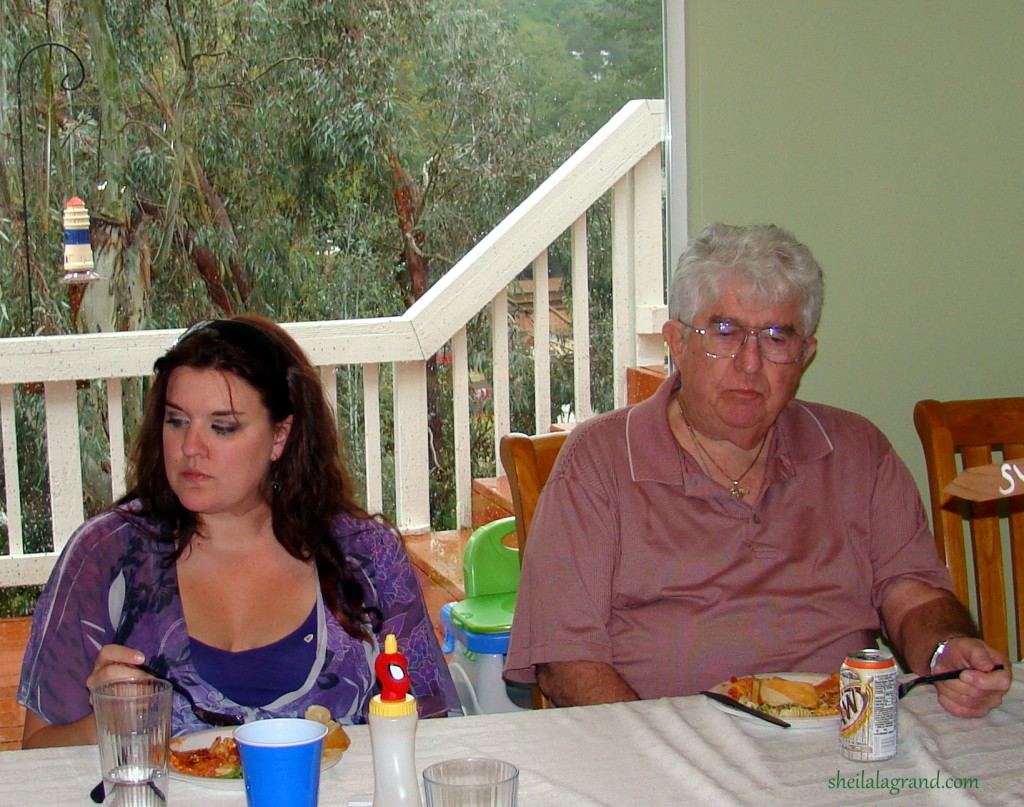 Elaine and Her Grandfather. January, 2011.
Elaine and Her Grandfather. January, 2011.
I grew up in a home that oozed love. I am pretty sure that if you drove past our house, you could smell affection’s sweet aroma from the street. My parents encouraged, guided, and cared for us: You want to play softball? I’ll coach the team. You have a sore throat? Let me make you some potato soup. As good parents everywhere do, they also disciplined us, teaching us to be kind, fair, and polite.
So at dinner time, Dad might dispense instructions like take smaller bites. Chew with your mouth closed. Keep your napkin in your lap. Take your elbow off the table. Today I value those lessons, but at the time, they occasionally dimmed my enjoyment of the evening meal. I would come to the table wriggling with the excitement of the day’s adventures, eager to share tales of my escapades as we enjoyed Mom’s meat loaf, french-sliced green beans, and a salad of iceberg lettuce and tomatoes, dressed in mayonnaise. My parents were eager to hear my stories, but only to the extent that I could recount them while observing the proprieties of the table.
Every now and then, I left the table with a slightly bruised heart, sad to know that my father valued me chewing with my mouth closed above my breathless description of watching Joey Badger’s mom make homemade strawberry jam. Goodness, who knew strawberry jam could be homemade? My six-year-old self couldn’t even imagine. But swallowing that bite of mashed potatoes before speaking was essential even when I had such amazing discoveries to share.
As a mother, I sought to teach those same manners to my own daughter, but I wanted to do so gently. One of my standards of gentleness was that correction, when needed, was done in private–or as unobtrusively as circumstances permitted.
Which brings us to Christmas dinner, circa 1994, the year I got really, really angry at the dinner table. Of course, manners prevented me from expressing my anger, but I stewed behind my smile.
We sat gathered around my parents’ good table, enjoying the holiday meal together. In the midst of passing the cranberry sauce I noticed that my daughter, who was 12 or so, had propped her left elbow on the table. I turned to look at her, and when she met my gaze, I lightly, quickly, ever-so-subtly grazed the back of her offending left arm with my index finger. She smiled and tucked her hand into her lap.
She’s fine, my father announced in a big voice. Leave her alone.
The anger that flared inside me astounded me. What on earth? Why should one comment from my dad infuriate me so? Late that night, after the pumpkin pie, after the good-nights and the bundling off into the December night, I lay awake and pondered that sneak attack of volcanic anger.
Dad undermined my parental authority! Anyone would be angry! I fell asleep that night mulling an appropriate response to such an affront. Delivered at Christmas dinner. In front of the whole family. By my father.
Thankfully, a night’s sleep tempered my indignation. I awoke to discover a jagged insight crammed into that space where I’d been nurturing my outrage.
I wasn’t angry because my father contravened my efforts to raise a well-mannered girl. I wasn’t angry that my girl’s grandpa had overruled me. No. This anger belonged to that six-year-old girl who was cut off when she tried to share her amazing homemade jam discovery.
Sometimes we elevate childhood hurts on a high pedestal in the museum of our own life stories. And some children, sadly, experience horrible, awful, unspeakable wrongs that demand a place of prominence in their personal histories.
But me? This particular hurt? I was just holding on to a thirty-year old grudge.
It isn’t pleasant to wander through the museum in my mind and tear down the monuments to old slights that have grown monstrous through the years.
Unpleasant work, yes–sometimes even absurd work. Each generation, while lovingly welcomed into a family, sends us roaming through another wing filled with memories of What.Went.Before. It’s another chance to discover, and disown, old hurts.
Whoever restrains his words has knowledge,
and he who has a cool spirit is a man of understanding.Proverbs 17:27 (NASB)
Please join us.





Mmmm…I remember that. The chewing with the mouth open, the elbows on the table, and those lessons weren’t bad. Great point.
Thanks, Sarah. I’m glad I was reared that way. But at the time…I didn’t appreciate it so much.
“It isn’t pleasant to wander through the museum in my mind and tear down the monuments to old slights that have grown monstrous through the years.”
Amen to that, sister, but it’s a destruction that brings so much joy and freedom.
I’m learning that, Patricia. I find I’m better at keeping short accounts now than I am at working through the backlog.
And it’s a big backlog. I have much to gain by sifting through it.
wow this is a wonderful writing. Yes I was raised with the same ‘disciplines’ at the table, including a slap with a fork if one was out of order on the etiquette. I also don’t remember good conversation at the table. It wasn’t there. We ate in silence. We had manners. It was stiff and uncomfortable.
As a grandma I try to do both, manners and listening. Matters of the heart can be blended nicely with proper etiquette and poise. With grand daughters learning to be young ladies I train them to set the table, and how to do it properly. I train them to use place mats if we don’t have the tablecloths on.
We laugh, we talk, we balance the good, and the lessons of improvement.
It is all about balance.
And the bad parts of my child hood, yes there were many as you put it in the museum of our life’s stories. I can put them aside and not allow them to hound my ‘day to day’ now time. For a season memories disturbed me, and I worked on those in therapy. For now, I choose to put them away, and let the future and the ‘legacy’ to be real, fun, and positive one for those children who are watching.
Sharon, thanks for sharing. I’m glad you got through that season. We can always choose joy, right? But sometimes we’re not willing to let go of our crud–and we can’t grab on to joy if our hands are full.
When growing up I was taught and expected to finish my meal, even if there were foreign looking objects (with foreign tastes) on my dinner plate.
The result of not finishing an entire meal was… “No dessert for you”!
Many a night I sat in my chair long after the family had eaten their dessert and left the table to go play games or watch television together.
it has taken my adult palate years to get used to eating Brussel sprouts…even to this day!
Fast forward from my childhood to the age of our eldest son who at the time was 9 or 10 years. We hosted my parents for dinner one night. No a holiday or even a celebration…just a dinner together in our home.
Those present were my mom and dad, my husband our 3 grade school aged sons and myself. As part of the menu this particular night were peas. Son was dished a small portion on his plate to which he made a disgusting face aimed toward me. The dinner conversations flowed with humor and giggles as my dad was real big comic at heart. As the meal was over I got up to get the dessert….brought it back to the table and served everyone their own dish of delectable sweetness and a family favorite…ice cream…all that is with the exception of the eldest son who continued to push his now cold peas across his plate looking intensely to them as if to make the disappear! My mom gave me a glance as to question why he did not get his portion of ice cream, I ignored her stares.
The table was in process of being cleared while son sat in his chair with his dreaded portion of peas. My mom came in to the kitchen holding some dinner plates. As she approached the sink where I was standing she very quietly asked me, “Why on earth or you refusing him his dessert? to which I replied, “mom you brought up 3 kids with the same exact house rule when it came to dinner…..not finished or refusal to eat a dreaded food then “No dessert for you…recall that one Mom? She placed the dirty plates in the sink….and stuck her tongue out at me and said this to me, “ it will not make a difference in 10 years or 100 years if he eats those peas or not!!!”… and with that she scooped him up a big bowl if ice cream, placed it in front of him and brought his plate to the sink. As I watched this shocking moment I walked to the door way separating the kitchen from the dining room to hear this between grandson and Grandma. Son, “Grandma I cannot have my dessert because we must eat everything…..before he could complete his sentence she said to him, “Just so you know grandparents and parents alike can make mistakes from time to time, now you just enjoy every bit of this ice cream”
Mom returned to the kitchen with his plate with the unfinished very cold peas , placed it into the sink and and gave me a hug. I hugged her back and as we stood there embraced in each others arms she told me for the first and only time that she too…..had made many a mistake in raising her kids.
One gem from this moment is that a gag reflex is so not worth finishing….very cold peas or in my case Brussel sprouts!
The more important gem from this was learning my mom knew she was not a perfect parent and she did not expect me to be either.
Thanks for sharing your experience, Linda!
I have heard it said that much of our parenting is either a replica of our parents’ choices or a reaction against our parents’ choices. How did it feel to hear your mom confess that she too, was human?
In my case, with respect to cleaning our plates, my mom definitely was reacting against aspects of her own upbringing. Our rule was that we had to taste something before announcing that we didn’t like it.